#conlang challenge
Explore tagged Tumblr posts
Text
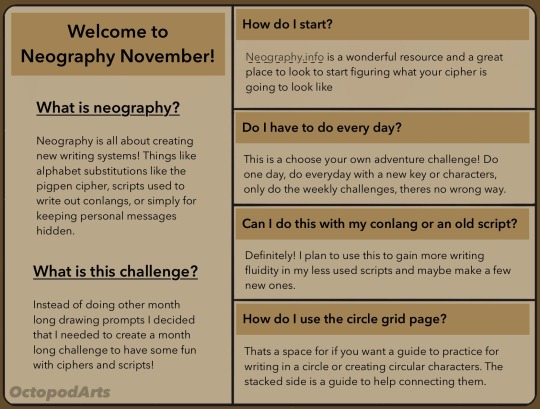
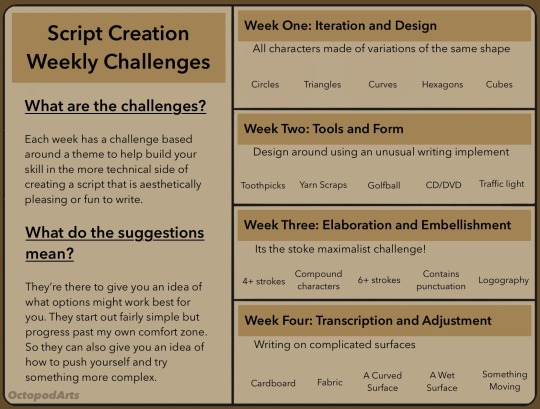
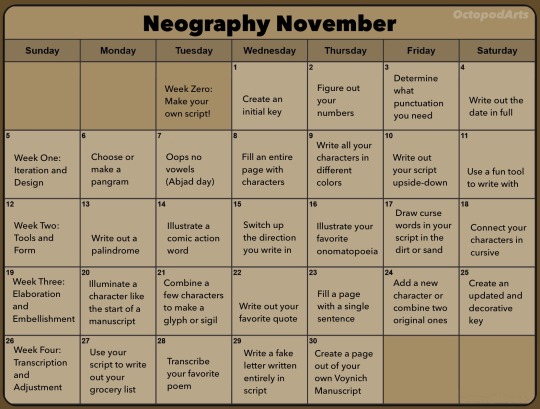
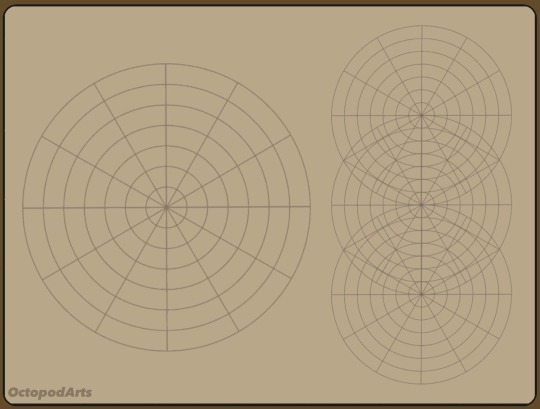


In celebration of this finally being done and in the hope of generating some hype before it starts im releasing my pet project into the wild a few days before its set to start!
Here is a full month long challenge to get people into my favorite hobby with me! Feel free to share this post and tag me in your creations or use the tag Neography November
Under the cut is each of the daily and weekly challenges in an easy to copy list!
Week Zero: Make your own script!
Create an initial key
Figure out your numbers
Determine what punctuation you need
Write out the date in full
Week One: Iteration and Design
Choose or make a pangram
Oops no vowels (Abjad day)
Fill an entire page with characters
Write all your characters in different colors
Write out your script upside-down
Use a fun tool to write with
Week Two: Tools and Form
Write out a palindrome
Illustrate a comic action word
Switch up the direction you write in
Illustrate your favorite onomatopoeia
Draw curse words in your script in the dirt or sand
Connect your characters in cursive
Week Three: Elaboration and Embellishment
Illuminate a character like the start of a manuscript
Combine several characters to make a glyph or sigil
Write out your favorite quote
Fill a page with a single sentence
Add a new character or combine two original ones
Create an updated and decorative key
Week Four: Transcription and Adjustment
Use your script to write out your grocery list
Transcribe your favorite poem
Write out a fake letter written entirely in script
Create a page out of your own Voynich Manuscript
Week One: Iteration and Design All characters made of variations of the same shape [Circle, Triangle, Curves, Hexagons, Cubes]
Week Two: Tools and Form Design around an unusual writing implement [Toothpicks, Yarn scraps, Golf ball, CD/DVD, Traffic light]
Week Three: Elaboration and Embellishment Its the Stroke Maximalist challenge! [4+ strokes, Compound characters, 6+ strokes, Contains punctuation, Logography]
Week Four: Transcription and adjustment Writing on complicated surfaces [Cardboard, Fabric, A curved surface, a wet surface, Something moving]
123 notes
·
View notes
Text
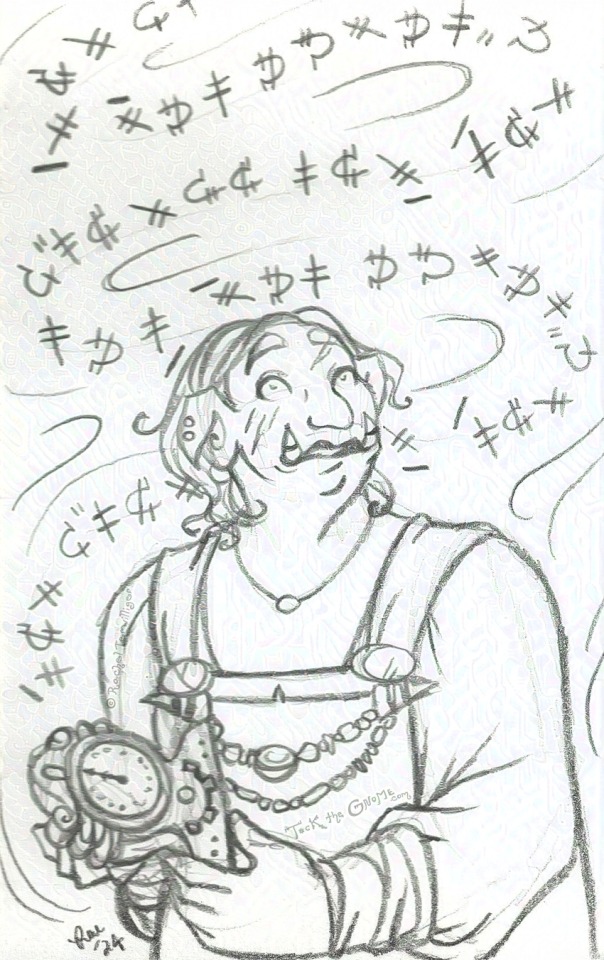
Artificer (Orctober 2024/WBW)
Day thirty!! 💚⚔
That said, time for another "Tock the Gnome" world building post, dear readers!
This week, from the literal definition of the word of the prompt, we are looking at an in-realm Orcish takeback of the term "Orcs."
Full notes here ✨💬📜💬✨
(Only one left, ya maggots!!)
~
Bonus art and stories ~ Prints, comics and more!
#orctober#world building wednesday#faerie#orcs#orc#orc woman#body posi art#conlang#tock the gnome#indie comics#queer comics#world building#ooh shiny#bonus art#drawing challenge
13 notes
·
View notes
Text
Thinking about the language fic post, but honestly... I'm more tempted to conlang some stuff together because that's really the best way to actually get underlying language bits to reference. Otherwise it won't make much sense.
Downside: I have too many questions to ask based on the limited information available about the language(s) used by alien robots. I'm not really sure where to start.
I'm not touching on varieties of "speaking hand" yet. Yet. That is a threat.
Let's start with: PHONOLOGY & PHONETICS
For example, question number one: what would any given language spoken by Cybertronians sound like?
There's no reason alien robots should use verbal speech in ways familiar to us, either via human-like vocal tracts even via "verbal" means at all.
Because they are aliens. Because they are robots. Both separate reasons that are somewhat independent of each other.
Some things have to be assumed to be similar as part of the conceit of the material of the material given to us. Material between continuities is quite different so for sanity, lets pick IDW1.
Conceits we're forced to work with:
Cybertronians are repeatedly shown to whisper, shout, and make sounds with their mouths or some sort of vocal apparatus in the mouth/throat area if their mouths have been removed. Therefore, their vocal tract is mostly analogous to ours for most intents an purposes. Perhaps some of the sounds that come out are necessarily different or could have additional features or limitations based on the shapes and motion ranges of their articulatory organs.
Cybertronian speech (for Neocybex specifically) in the original writing of the continuity is rendered in English (under the guise of scifi Universal Translator tech). Sometimes British English varieties, sometimes American English varieties, depending on the writer. While this is a necessary conceit for a comic book meant for an English-speaking audience, this means we don't actually encounter a lot of the sounds (or renderings thereof) of Neocybex and its varieties as it's spoken. This also biases us to understand their cultures through the lens of localization to English (but that's a secondary problem).
Limited stock of Neocybex words are available as a result of the previous point. Mostly we have toponyms (place names), religious vocabulary (the roots of which are usually Latin or Greek and thus could also be seen as the result of localization rather than the original vocabulary), and personal names (many of which are also localized for our convenience). Even legal terminology is translated into English words. We really only get toponyms as a source.
The available word stock is rendered in the English version of the Roman alphabet for the necessary conceit of "writing in English for the audience." That means that sound capture of those Neocybex words is inherently imperfect since it's limited by the writing system. Also as the material is written, we don't know what it actually sounds like (broadly). Romanization is a loose approximation at best.
That makes what their available phonological and phonetic systems look like a bit of a headscratcher.
But we do know one thing for sure.
Windblade can't pronounce /θ/ (the voiceless dental fricative at the end of "earth"). This sound is reportedly difficult to pronounce for Cybertronians and the English toponym of our planet is also not being picked up by their Universal Translator (which amusingly also doesn't work on non-Neocybex Cybertronian languages like Primal Vernacular).
I still have no idea what Neocybex sounds like, but I know it doesn't have /θ/.
Anyway, I'm going to keep pondering this.
I have many more questions.
Are there forbidden syllable structures?
Is it a tonal language to some degree? How is the language timed (mora, stress, syllable, etc.)?
What is the orthography like (because the ones we're given are English ciphers, which is bullshit)? Are there non-verbal components only present in the orthography?
How related to modern Neocybex is Primal Vernacular? Is it the ancestor language? Was it restricted to liturgical use after a certain period?
What is the grammar like? What features are marked and in what way? Does it have grammatical case? Does it have noun classes? Does it mark animacy? Does it use word order to make grammatical meaning?
What is the syntax like more specifically?
What is the morphological typology?
[voice trails off into the distance, still asking questions]
#admin post#one of the biggest challenges with conlanging or linguistic study#is not bringing your own preconceived notions or assumptions about language to the table#linguistics was a major part of my college education so here we are#post-MA and talking about robots
12 notes
·
View notes
Text
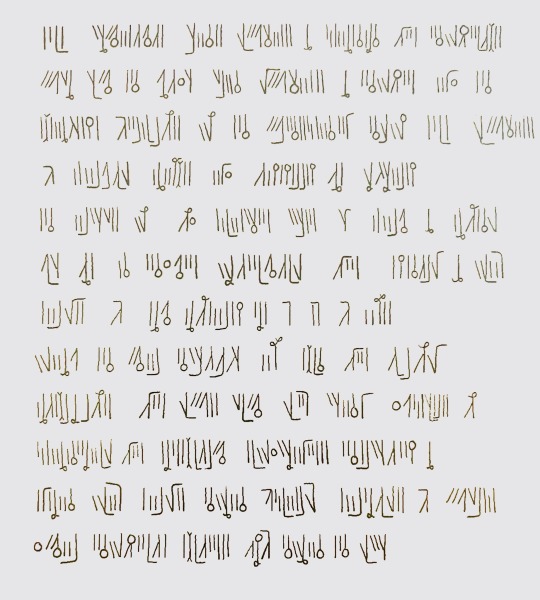
In an alphabet I made for a dnd game.
This corresponds to English. There are more than 26 letters but not many more than 26. No numbers appear in this text.
I’m honestly not sure how possible it is to decrypt without a partial key. But I’m willing to post additional text, draw anything ambiguous on a grid, etc.
38 notes
·
View notes
Text
had this in my likes for a month but here’s my attempt at an ancient greek translation:
ἐγω μεν, της Μιεττης πλευροθεν κουφως τῳ ποδι ἁπτομενη: Μιεττη, ἀπαγε μη πταιω προς σε
Μιεττη δε, μεγιστοιν τοιν ὀμματοιν: ἆρ’οὐ λακτιζεις συ την Μιεττην; ἆρ’αὐτην τῳ σωματι ὡς τον ποδοσφαιρον δη λακτιζεις; οἰ! οἰμοι! το δ’οὐν δεσμωτηεριον τῃ μητρι! τῃ δε μητρι το δεσμωτηριον χιλια ετη!
and for a literal retranslation:
Me, touching Miette gently on the side with my foot: Miette, away with you in case I trip over you
Miette, with both of her massive eyes: you kick Miette? You kick her on the body like the football indeed? Woe! Woe is me! Jail for Mother! Jail for Mother for one thousand years!
mē, tangō leviter Miētte cum latus pedīs meī: Miētta, dēmovēre ut nōn incurrere in tē
Miētte, cum oculōs ēius magnōs: tū CALITRĀS Miētte? tū calitrās corpus ēius sīcut follis? ēheu! ēheu! carcer prō Mātre! carcer prō Mātre prō Singula Mīlla Annōs!!!!
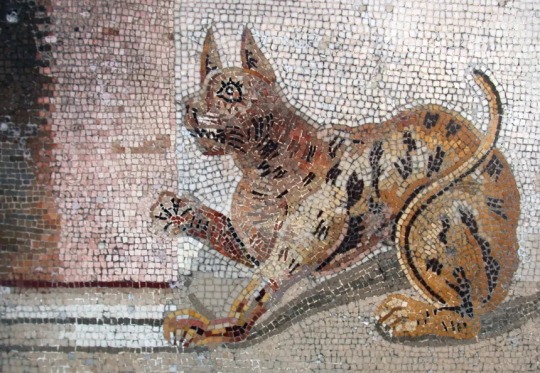
#best part of this is getting to use οἰμοι for ‘woe is me’#i think using the ἆρʹου for the emphasis there is quite nice as well#been like two years since i was doing prose comp regularly so#fun challenge for myself#working on it in my conlang as well#oh and the dual on ὀμματοιν#can’t forget that
17K notes
·
View notes
Note
hey friend, i know you’ve been a pretty serious supporter and user of duolingo for a long time (so have i!), so i’m curious what your feeling is about the announcement that they’re going to be doubling down on using more and more AI for content creation, including using it to avoid having to hire actual humans?
personally, i’m really disappointed - i’ve disliked how much they’ve been using it so far, but the app is otherwise a great tool, and all of the other apps seem to use it, too, so it’s not easy to just jump ship to an app that isn’t using AI. i’ve seen a lot of responses that are like “hurr hurr just use a textbook idiot” which i find really unhelpful; learning from an app is easier and a lot more convenient in a lot of ways than having to use analog materials, especially if you study a high number of languages. still, i don’t ethically feel that i can keep giving them money if this is the direction they’re going.
what are your thoughts?
This is going to be a longer answer than you might have expected.
In 2001, fellow undergrad. Reiko Kataoka (now a professor at San Jose State) resurrected a club that had been dead for a few years at UC Berkeley linguistics: The Society of Linguistics Undergraduates (SLUG). One of its former undergraduate members, Alan Yu (now a professor at the University of Chicago), happened to be a graduate student at Berkeley at the time, so he helped her get it off the ground. The club was exactly what I was looking for at that time: a group for ling. undergrads. to get together and talk about language and linguistics, my new favorite thing. It was great! I even put together a couple phonology problems using my conlangs to distribute at a meeting. The following year I became the second president of the new SLUG and helped to create the SLUG Undergraduate Linguistics Symposium, where I gave my first talk on language creation. Being a part of this club was a major factor in shaping my undergraduate experience at Berkeley.
When I graduated I went to UC San Diego to pursue a graduate degree in linguistics. Part of the reason I chose UCSD was because it was an incredibly inviting atmosphere. Before we accepted they paid for prospective undergraduates down to San Diego and housed them with current grad. students who told them about the program and took them out for dinner, etc. It allowed prospective students to ask questions they wouldn't ask of professors (e.g. who's got beef with who). It was really cool, and so in our second year, we continued the tradition of housing prospective grad. students. Since we both went to Berkeley, my ex-wife (also a Berkeley ling. grad.) and I hosted Klinton Bicknell.
Klinton, it turns out, was the current president of SLUG. I didn't know him while I was at Cal, but we did overlap. It turns out he had renamed the club SLUGS, which I thought was weird. He said "It happened organically" and laughed in an off-putting way. He very much gave off the impression of someone who will smile at you and say whatever is necessary for you to go away. Klinton ended up going to UCSD the following year and I ended up leaving the following year.
Fast forward to 2016. HBO had put the kibosh on Living Language Valyrian, and so I turned to Duolingo. They had previously reached out about putting together a Dothraki course, but I declined, due to having a book out, Living Language Dothraki. With no hope for Valyrian, I asked if they'd be interested in me putting together a course on High Valyrian, which I did. I had some help at the beginning, but, truth be told, most of that course was built by me alone. I became very familiar with the Incubator, where Duolingo contributors built most of their courses. It was a bit clunky, but with enough elbow grease, you could put together something that was pretty darn good. It wasn't as shiny as their in house courses, because they couldn't do things like custom images, speaking challenges, etc., but it was still pretty good.
At the time I joined, everyone who was working in the Incubator was doing it for free. We were doing it because we wanted to put together a high quality course on our language of choice on Duolingo. When Duolingo went public, they realized this situation was untenable, so they began paying contributors. There were contracts, hourly wages, caps on billable hours, etc. It essentially became an as-you-will part time job, which wasn't too bad.
The Incubator faced a couple potentially insurmountable problems. When the courses were created by volunteers, Duolingo could say "This was made by volunteers; use at your own risk", essentially. Once they were paid, though, all courses became Duolingo products, which means they bear more responsibility for their quality. With so many courses (I mean, sooooooooo many courses) it's hard to ensure quality. Furthermore, "quality" doesn't just mean "are the exercises correct" and "are the sentences interesting". Quality means not being asked to translate sentences like "Women can't cook" or "The boy stabbed the puppy". With literally hundreds of courses each with thousands of sentences written by contractors, there was no way for Duolingo to ensure not just that they were staying on brand with these sentences, but that they weren't writing ugly things. There were reporting systems, there were admins that could resolve things behind the scenes, but with so much content, it became a situation where they would have had to hire a ton more people or scale back.
We saw what Duolingo did before with one aspect of their platform that had a similar issue. If you remember way back, Duolingo used to have a "forum", that was a real forum, but for most users, what it meant was on every single sentence in Duolingo users could make comments. These comments would explain grammar points, explain references, make jokes, etc. It was honestly really helpful. But, of course, with any system like that comes trolls, and so volunteers who had come to create language learning resources also found themselves being content reviewers, having to decide which comments to allow, which to delete, who to ban, etc. As Duolingo became more popular, the troll problem grew, and so eventually Duolingo's response was to kill the forum. This mean you were no longer able to see legitimate, helpful comments on sentences. They threw the baby out with the bathwater.
This is why it was no surprise to me when they shuttered the Incubator. The technology was out of date (from their standpoint, you understand. Their in house courses were way more sophisticated, but they couldn't update the Incubator without potentially breaking hundreds of courses they hadn't created themselves), quality assurance was nearly impossible, and they were also paying people to create and maintain these out-of-date courses they had no direct control over. Of course they closed it down. It would've taken a massive investment of time and resources (and capital) to take the Incubator as it was and turn it into something robust and future proof (think old Wordpress vs. Wordpress now), and Duolingo wanted to do other things, instead—like math and music. And so the Incubator died.
But that wasn't the only reason. This was something we heard internally and then heard later on publicly. There was rumbling that Duolingo was using AI to help flesh out their in house courses, which was troubling. This was before the big Gen AI boom, but after a particularly pernicious conlang-creation website I won't name had come to exist, so it caught my attention. I decided to do a little digging and see what this was all about, and I ended up with a familiar name.
Klinton Bicknell.
Indeed, the very same Klinton Bicknell was the head of all AI ventures at Duolingo. Whether enthusiastically or reluctantly or somewhere in between, he was absolutely a part of the decision to close the Incubator and remove all the contractors who had created all the courses that gave Duolingo its reputation. (Because, seriously, why did most of us go to Duolingo? Not for English, Spanish, French, and German.)
I know you sent this ask because of the recent news about Duolingo, but, to be honest, when I saw one of these articles float across my dash I had to check the date, because to me, the news was old. Duolingo isn't just now replacing contractors with AI: They already did. That was the Incubator; those were contractors. That is why there won't be more new language courses on Duolingo, and why the current courses are frozen. This isn't news. This is the continuation of a policy that had already firmly in place, and a direction that rests solidly on the shoulders of Klinton Bicknell.
But you don't have to take my word for it. He's talked about this plenty himself:
Podcast (Generative Now)
Article in Fast Company
Article in CNET
Google can help you find others.
At this point there's a sharp and baffling division in society with respect to generative AI. On the one hand, you have those of us who disapprove of generative AI on a truly fundamental level. Not only is the product something we don't want, the cost—both environmental and ethical—is utterly insupportable. Imagine someone asking you, "Hey, would you like a sandwich made out of shoelaces and shit?" And you say, "God, no, why would anyone ever want that?!" And their response is, "But wait! To make this sandwich out of shoelaces and shit we had to strangle 1,000 kittens and drain the power grid. Now do you want it?"
On the other side, there are people who are still—I mean today—saying things like, "Wow! Have you heard of this AI thing?! It's incredible! I want AI in everything! Can AI make my table better? Can I add AI to my arthritis? We should make everything AI as quickly as possible!"
And conversations between the two sides go roughly like this:
A: Good lord, now they're using AI art on phone ads? Something has to stop this… B: Yeah, it's so cool! Look, I can make a new emoji on my phone with AI! A: Uhhh…what? I was saying it's bad. B: Totally! I wonder if there's an AI shower yet? Like, it could control the temperature so you always have the perfect shower! A: Do you know how much power it takes to run these genAI apps? At a time when we're already struggling with income inequality, housing, inflation, and climate change? B: I know! We should get AI to fix that! A: But AI is the problem! B: Hey ChatGPT: Teach me how to surf!
It's frustrating, because the B group is very much the 💁 group. It's like, "Someone was using ChatGPT and it told them to kill themselves!" and they respond, "Ha, ha! Wow. That shouldn't have happened. What a learning opportunity! ☺️ Hey ChatGPT: How do you make gazpacho?" There's a complete disconnect.
In terms of what you do with your money, it's a difficult thing. For example, I've used Apple computers consistently since 1988. I'm fully immersed in the Apple ecosystem and I love what they do. They, like every other major company, are employing AI. If you go over to r/apple any time one of these articles comes out, it's all comments from people criticizing Apple for not putting together a better AI product and putting it out faster; none saying that they shouldn't be doing it. They're all ravenous for genAI for reasons that defy my understanding. And so what do I do? I've turned off the AI features on all my Apple devices, but beyond that, I'm locked in. From one direction, I look like a hypocrite for using devices created by a company that's investing in AI. From the other direction, though, I am using their devices to say what they're doing is fucking despicable, and they should stop—and I'll keep doing so so long as there's breath in my body.
Duolingo isn't necessary the way that, say, a computer or phone is nowadays. Duolingo is still usable for free, though, of course, they make it a frustrating experience to use its free service. (This is certainly nothing exclusive to Duolingo. That's the way of everything nowadays: streaming services, games, social media... Not "Well give you cool things if you pay!" but "We'll make your life miserable if you don't!") If you do use their Incubator courses, though, I can assure you that those are AI-free. lol They're too outdated to have anything like that. Some of those courses are bigger than others; some are better than others. But all of them were put together by human volunteers, so there's that, at least. At this point, I don't think Duolingo needs your money—nor will they miss it. They're on a kind of macro plane at the moment where the next ten years will either see the company get even bigger or completely disintegrate; there's no in between. They're likely going to take a big swing into education (perhaps something like Duolingo University [Duoversity?]) and it's either going to make a ton of money or bankrupt them. I guess we'll have to wait and see.
I've taken the Finnish course in its entirety and we're doing Hungarian now, and I've learned a lot—not enough, but a lot. I'm grateful for it. I like the platform, and I agree with the basic tenets of the language courses (daily shallow intake is better than occasional deep intake; implicit learning ahead of explicit instruction is better than the reverse). I'm grateful they exist, I'm grateful we can still use them (because they can always retire all of them, remember), and I think it's brought a lot of positivity to the world. I think Luis Van Ahn is a good guy and I hope he can steer this thing back on course, but I'm not putting my money on it.
347 notes
·
View notes
Text
BG3 Elven Names: A Watsonian Perspective
Amongst folks who like Astarion as a character, the meaning of his name is a common topic of discussion. The answer is typically that it is a variation of Astērion (Ἀστερίων), a Greek name meaning starry, which makes complete sense considering that he is likely a moon elf, but it is based in a language that does not actually exist in the Forgotten Realms. This isn’t a problem, a Doylist answer is completely valid, but I thought it would be fun to figure out what the meaning would be in Elvish (the D&D version), a Watsonian answer (1). After Astarion's, I set out to see if this could be done with Halsin and Cazador as well. I present here my results, with narrative. I have also included a TLDR at the end for those who want to skip the methodology.
(1) To any who may not be aware: Doylist means that it is what the author was thinking when writing / what their intention was. Watsonian means the in-universe perception / explanation. Example: Why did magic change so much between D&D 3.5e and D&D 4e? Doylist answer is that they wanted to simplify how magic worked to draw in new players. Watsonian answer is that Mystra was assassinated by Shar and Cyric resulting in arcane magic becoming unstable and changing its behavior.

In the Lack of Duolingo
First things first, I needed a resource for the Elven language in D&D. As with many collaborative canons, official uses of the language were spread through many mediums and over the course of decades. This makes hunting down sources difficult, but luckily a wonderful person by the name of Diane Morrison was kind enough to create ‘A Treatise on Espruar,’ which offers a complete dictionary. This is what I will be using:
A quick disclaimer that, also like with many collaborative canons, this language has inconsistencies and gaps which makes a true cannon language impossible until a complete conlang is officially released. What I present is to the best of our current resources.
Method to the Madness
I have the words, but next comes the challenge of using them. These names were not made to be interpreted in the lens I am using, so it is kind of like trying to fit a square peg in anything but a square hole. Some words can line up near perfect but have meanings that make absolutely no sense, like dragon royal world, or some words can have the right meanings but have the wrong letters. I resolved this with the following criteria:
The words used must be as close to the name as possible.
Sound shifts must be minimal and not drastic.
As few letter drops as possible.
A meaning that makes sense in context (as much as possible).
Key
Word / part of word Meaning

Astarion
Something noteworthy about Astarion’s name that I kept in mind when translating it is that it was his ‘child name’, the name that was given to him by his parents and not one he chose for himself (2). This means that the meaning wouldn’t necessarily be one that he himself liked, but rather one that a parent would like to ascribe to their child.
Searching for words, one almost seemed perfect at first: Aasterinian (meaning quicksilver). It was already so close to his name without having to Frankenstein words together, but sadly it broke nearly all of my rules. It had three letter drops and two sound shifts: er to ar and ian to ion. I also was of the opinion that while quicksilver was a fine name meaning, it wasn’t one that felt like it was meant for a child.
So, the next option was a combination of Aestar (meaning together or one heart) and -ion (meaning noble). I was hesitant of this one at first. The meaning I wanted to use for Aestar, heart, had seemed to be reserved for the context of marriage at first glance, but then I saw the name Araestar with its meaning of Goldheart. This is evidence that heart is valid for names as well.
Thus, my Watsonian idea is that Astarion’s name comes from Aestarion, which translates to noble heart. This only has one letter drop and a slight sound shift from Ae to A. I also personally think noble heart is a fitting meaning for a child’s name.
(2) Astarion’s tombstone has his name and states he was 39 when he ‘died’. Elves are typically considered adults and choose their new name when they reach the age of 100.
Halsin
Halsin was a bit of a hard one, where there were tons of possibilities but near all of them just didn’t fit right. Halsin is 350 years old, he would have presumably chosen his name with a meaning that represented him as a person. He, in my opinion, wouldn’t have a name that meant something random like weak brook or red. In addition, I had to find a combination of words that fit my rules.
So, I had to write down three prefix possibilities, five word possibilities, three suffix possibilities, and mix and match until I got something that met my criteria. I won't include my rejected combinations due to their number, but here are some reasons I rejected them: ‘r to l sound shift is too drastic’, ‘the on sound is too different from in’, and ‘though m and n are close in the IPA the sound shift feels too great’. Luckily, I did find a combination I was satisfied with in the end.
My Watsonian idea is that Halsin’s name comes from Halasan which translates to one who is free and wild. The ending of Halasan would likely be pronounced like in already so it would only be a letter change instead of a sound shift. The only other change needed would be a letter drop, the a in las.
Cazador
Now this name I went in thinking that it would be the true challenge, the 'z' felt distinctly non-elven to me, but much to my surprise D&D elven does have the z sound and letter. It was still hard to get a good meaning out of it, especially since it is unknown whether this would be his child name or his adult name and there was only one combination of words that worked.
The collection of words at my disposal were cas which means herald, -adar which means world, and za which means royal, of royalty. From this, I got Cazadar, which is a modification of Casadar that adds za. This would give a direct translation of herald of royalty world, which I feel would be interpreted as royal herald (to the world). It isn’t the cleanest meaning, but I feel like there is ego and world domination vibes to it, so it works.
A slight tangent, it is debatable how valid my overlapping construction is. It is possible that the shift from cas to caz would be seen as just a letter shift and not an addition of the word za. This wouldn’t be a problem, herald of the world is still a valid meaning for my purposes, despite it losing some of the ego. There is also the possibility that the za is seen but it results in the caz being interpreted as ca, a letter shift from ka which means dragon. Since there is no dor or dar in elvish, it is possible that it would be seen either as an ornamentation or a shortening of -adar, in which case the translation becomes dragon of royalty or dragon of royalty world. These meanings aren’t horrible in the case of a wrongful interpretation, but it doesn’t entirely make sense, and Kazaadar breaks the rules I imposed.
With all this being said, my Watsonian idea is that Cazador’s name comes from Cazadar, which can be translated to royal herald (to the world). This is the one name that I created that feels like a stretch, but I tried my best.
Last Names
I originally only did the first names when I decided to make this, but then I realized while typing all this that this probably wouldn’t be complete without trying the last names too... and so, I decided to give them a try. I sat down with the elven dictionary and felt the hope leave my body as soon as I wrote them down on my scrap paper. Ancunín, with a little accent on the ‘i’ and a super rare letter for D&D elvish, ‘u’; and Szarr, with two consonants (S and Z of all things) next to each other. I predicted a struggle, a struggle is what I got, and I fled the battle, unsuccessful. I was not able to find anything that met my rules… yet.
I will revisit this someday, but it will require a lot more research on Faerûn than I am able to put in right now, sadly. Here is the fun thing about last names, they are often more influenced by location as opposed to the ethnic origin of someone. Case and point: in the US a lot of folks changed their last name upon arrival to better fit in, or it was messed up enough times that they changed it for convenience sakes. Examples: Müller turning into Miller (a spelling change), Zimmermann becoming Carpenter (a direct translation), or going from Sadowski to Smith (A complete change to assimilate). They also have a different meaning convention compared to regular names to begin with, where they can be based on the location an ancestor lived, their occupation, or their nickname.
A Watsonian answer may exist for Ancunín and Szarr, but it would be rooted in where their families lived through the eras and other local languages that might have influenced the original elvish version. Like perhaps the location the Ancunín family is from has a predominant language which favors ‘u’ as a vowel. Maybe Szarr isn’t elvish at all and is an occupation name. I don’t know if I will be able to find a satisfying answer, but if I do one day I will be sure to post it.

Bonus
Espruar is the alphabet of the elvish language, which looks really cool in my opinion. Before I even started looking into the Watsonian origins of the names, I thought it would be cool to see what their names looked like written in it and so vectorized all the letters. Below are the character's names and their origin names written with Espruar.
Astarion

Aestarion

Halsin
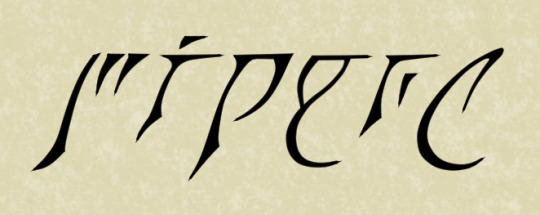
Halasan
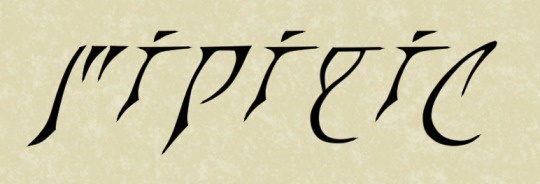
Cazador

Casadar

Cazadar


Little End Note
I want to thank everyone who read through my long explanations and tangents, I hope you enjoyed reading the thought process behind all of these ☺️. I also wanted to let you folks know that I am going to make another post soon with my vectorized Espruar alphabet so anyone can write with it should they want to.

TLDR

#super long post#sorry#there's a tldr at the very end#fun elven alphabet near the end in the bonus section#I tried to describe the letters best I could in the alt text too#bg3#bg3 meta#baldur's gate 3#baldurs gate 3#astarion#halsin#cazador szarr
164 notes
·
View notes
Text
Kryptonian Omegaverse

I almost never do fanart, but I wanted to do SOMETHING to thank @suzukiblu for all their wonderful fic. They've been playing with Darren Doyle's Kryptonian conlang, and I thought, "I can do conscript calligraphy! I'll just write some of their omegaverse terminology and some of the characters' names!"
This was supposed to be a few hours work, two Saturdays ago. That isn't what happened. Instead, I have STRUGGLED. Absolutely every aspect of this script has challenged me. It looks so INNOCENT, but lineweight, scaling, stroke style, character positioning ... everything has required pages of notes, trying to figure out how to make it work in my style.
This is my 6th good copy. I also have at least 10 pages of notes and practice. I had to do WORLDBUILDING (in an earlier post also tagged 'kryptonian') to try to justify how I'm drawing the circles. And you'll notice that this isn't even my full original idea!
Here is the Kryptonian for 'Alpha', 'Omega', and 'Beta', along with ideographic glyphs I designed for the three. The ideographs are combinations of the glyphs for 'my', and 's', 't', and 'k', respectively.
Names are still coming. But it's been over a week, and I needed to share something before I got overwhelmed. Now the project is smaller, and I might be able to finish!
(Rin, I decided to include the syllabic nasal at the beginning of ":dho kyn-tul". And write it with an 'n', instead of with the colon. But if you want to ignore it, just erase the three dots at the beginning of the phrase!)
#think I have a SLIGHTLY better method for the next part#which will lead to a cleaner result in less time#we'll see!#kryptonian#superfamily#conlang#conscript#gecko writes pretty
67 notes
·
View notes
Text
I was gonna make a long post about this but I'm too impatient. I'm making a fairy language a la Tinkerbell. language-that-sounds-like-bells is just too good of a challenge for a conlanger to pass up. it's currently a simple, tame, tonal language with a tiny vowel inventory and some inklings of noun classifiers. any thoughts from y'all? I checked around the internet in case someone previously had a similar quest but found few results
#idk if I'll make it more literally musical eventually#guh I have thoughts but I'll share them when I'm further along and if there's any interest#my posts#conlang#tinkerbell#df
27 notes
·
View notes
Text
I finally watched Nosferatu, yay
the visuals were juicy, and I also enjoyed guessing the languages used in the movie. while I clocked Romanian, Romani and Latin, I had a hunch there was something else and decided to look it up
turns out, Eggers wanted to use an extinct language for Count Orlok's spells and they hired Florin Lăzărescu, a Romanian novelist and screenwriter, to invent a language that was supposed to mimic ancient Dacian. yes, they conlanged it.
Dacian was spoken in the Balkans and modern-day Romania, but went extinct as far back as 6th century AD. the problem is, not much of the language survived and only a handful of words were reconstructed based on toponyms from the historical region of Dacia.
that was obviously not enough for the script, so Lăzărescu had the challenge of filling the gaps with his own interpretation of Dacian. while not exactly scientific, it still sounds like a ton of fun, he dug through PIE and other languages for that (tracing cognates, I guess?), plus, he was excited to highlight the language of his ancestors.
dude got THE dream job, to play around with languages, invent some words and get (hopefully) some pretty coin. shame I'm not smart enough to be a movie consultant
#they also spoke Enochian which I know nothing about#reading about that next#language#linguistics#langblr#conlang#nosferatu#horror
44 notes
·
View notes
Note
Happy Hanukkah! I hope you’re well.
Vaguely related question I guess. The parallels between the Jewish and Ashkari people were one of the things I loved most about this book. It’s not often you see a Jewish-coded character in a fantasy book - let alone as a hero. I saw in the acknowledgements you had a lovely Hebrew consultant - what were the challenges of creating a whole language? (Plus Sarthian and all the others??)
Hello! Yes, we don't see Jewish or Jewish-coded characters much (though more now than when I was growing up, and I felt very shut out of fantasy and fantastical worlds as it all seemed to contain a definite, sometimes unconscious, Christian bent). And often when we do see them, they're some variety of evildoer or hook-nosed goblin type.
I very much wanted to dig into my own cultural and religious background to furnish the mythology that underpins the Ashkar and their magic. Gematria (gematry in the book) is a Kabbalistic tool that can be used in the creation of the kind of amulet that Kel wears. Jewish readers will recognize mentions of specific names (Judah Makabi) bits of Hebrew (Shomrim, Sanhedrin) among other words and names extrapolated from Hebrew and Jewish history.
Ashkar is not Hebrew though. It is a "real" imaginary language in the sense that it was constructed to have a working system of verbs and nouns and conjugations and so forth. I didn't create it myself, because I am not Tolkien, who was a philologist first — a professor of languages and how they work. I worked with a conlanger, Matthew AbdulHaqq Niemi, who had a background in Biblical Hebrew, modern Hebrew, Arabic and Aramaic. We traded ideas back and forth, and he created a glossary and even written poetry in Ashkar. He and the other conlangers I worked with are thanked in the back of the book.
Matthew's translation of El Nora Alila into Ashkar:
Afaryaš vēmū, Afaryaš hazānū, Oqošakedsā-mav dayn fī tsīa,
God of awe, God of might, Grant us pardon in this hour,
Dalī kol Tasī-qēōt osl��g dayn lešex tsīa,
As Thy gates are closed this night.
193 notes
·
View notes
Text
Absolutely, thank you for asking!
When the first i'Qori revealed themselves as alters in our system, they remembered a few basic words in their language, but that was about it. More recently, Cassius (the youngest i'Qori) started on the task of actually creating and recording the rest of the language, including a written script. The language is now dubbed Qor'nal.

As for the written language, we used a hexagonal grid to create the letters. This is because the i'Qori are a somewhat insectoid species who used to communicate via pheremones; we wanted to evoke the look of molecular diagrams that could have represented those pheremones.
We're still figuring out a lot about this language, such as grammatical structure, vocabulary, and how to arrange the written words into sentences that don't just sprawl all over the page. But Cassius is really enjoying the process of making our own system conlang, and it's already come in handy to incorporate in our i'Qori related artwork!

XVIII: THE MOON
This piece features Ysmyr (he/she/they), one of the three active i'Qori (a nonhuman species native to our system). He's a clairvoyant who can read the future in the night sky.
The triangle-based designs on the corners are the conlang we are working on for the i'Qori language! The top designs say 18 and the bottom say "Moon."
#fun fact: through this process we actually discovered that cassius is a little dyslexic with his own language#his sense of spelling is awful lol#but he actually finds the conlang process a good challenge because of this!#conlang#conscript#plural system#plural artist#plural art
18 notes
·
View notes
Text
Conlang challenge: translate Caramelldansen into ur conlags
#conlangcrab#conlanging#conlangcrab talks#conlang#constructed language#linguistics#conlang idea#conlangcrab idea#dumb ideas#caramelldansen#translation
28 notes
·
View notes
Text

A compiled list of all the polls!
This will be updated as new categories go live.

Show that is begging the world to please stop making their fictional torment nexuses a reality. (AKA the Stop One-Upping Us Amazon Challenge award)
Listening to this show is cheaper than therapy.
Fuck I missed an important thing because I was listening to this show. (AKA the Do Not Listen While Driving award)
Best show a listener might not like at first, but really picks up to be something special after you give it more then three episodes and leaves you wanting more.
They warned us about this show but we didn't listen and now everything hurts.
I listened to the whole thing and still have no idea what’s going on. (AKA the It's Been A Wild Ride award)

Character most fully unaware of the genre they’re in.
Please just let us take them home and feed them soup (aka the Wet Cat Award)
The character that left us too soon.
The character that didn't leave us soon enough.
We hate them, but love every second they’re on air.
This character is entirely too pure for the show they're in (aka the Cinnamon Roll Award)
The most character of all time.

Actor most likely to jump-scare the listener (aka the Wait, they’re in this too??? award)
Look, all we want to know is when do they breathe. (aka the Pacing And Lung Capacity Award)
The actor whose voice wraps us up in a warm blanket.
If this actor was wearing pants, they acted them off. (aka the Scenery Chewing Award)
We heard their voice exactly once and immediately started daydreaming about who we wanted to hear them play (aka The Fan Casting Award)
Best blink-and-you'll-miss-it cameo

What do you mean it’s not punny? (aka the Highest Form of Humor Award)
Most likely to have detailed notes for expansive worldbuilding & backstory that doesn't appear on screen (aka the There's More Lore Than Script Award)
Writing this show is cheaper than therapy
Writer most likely to be lovingly bullied by their actors & fans.
Best made up word(s) even the writer can’t pronounce correctly (aka the Yes, But is It A Conlang Award)
Enemies-to-Lovers arc but it's you and this show's writer.

Is this a stock sound or custom foley????? (aka the We Do Not Deserve the Priceless Treasure That Is A Good Editor Award)
Longest credit sequence (aka the Award for Most Times Looping The Outro Music)
Most likely to make you say “Wait, This Wasn’t Recorded Live, In Person???” (aka the It’s Like I’m There Award)
Creator of the most artfully-awful misaphonic nightmare. (aka the Oh God It Squishes Award)
This soundtrack is a banger. ( aka the That's What the Kids Say, Right? Award)
-------------------------------------------------------------------------
And remember, any and all shows that released an episode in 2023 can be submitted to the Yearbook! Do that here!
56 notes
·
View notes
Text
Sdefa Sdaturday #3

This is a new short piece of music, which is also a text in my musical conlang Sdefa! It translates to:
Snow is falling outside the house. But inside the house is warm And a cat is sleeping peacefully.
Below is a simplified version of the text with a basic gloss. Rhythms and chords are omitted because they’re not part of the text itself. Full barlines divide words, and half barlines divide suffixes from their roots or other suffixes on the same word. In the gloss, the numbers refer to the three free suffixes used in the text. That’s explained a bit in this post, but the basic idea is that each noun is identified with a three-note pronomial suffix which is then used for subject or object agreement on a verb. The numbers aren’t grammatical person ���they’re all third person in this case—but are just the order in which they are first used.

There are a few different things I might have done with this text. For one, there’s no tense or aspect marking, since it isn’t required. Second, there’s actually no equivalent of “but” in the Sdefa text; instead, that section of the music has a couple of chord changes that bring a change in mood. I actually don’t have a way to say “but” in Sdefa yet, and I may leave it out of the language entirely.
I hope you enjoyed the music! Sdefa is a lot of fun to use and it’s an enjoyable challenge to make musical sense out of it. This post is coming a little later than usual both because it took quite a while to put this all together and because the recording was delayed due to a certain kitty cat being on my lap.
55 notes
·
View notes
Note
You haven't conlang/cypher posted in a bit and as someone who tried to use one of the ones you made occasionally I was wondering if you had any thoughts you'd like to share
ya know. i havent really had many cypher thoughts recently but i have been wanting to make a cypher based on the runes from sso so have a little low effort cypher.
very basic, letter to letter, some digraph shenanigans for fun. im thinking double letters is indicated by a dot above the letter, and maybe 'ey' is the y symbol with a dot or line under, like the og from sso
sso make a real conlang challenge

5 notes
·
View notes